Meri Ibrahim is an ambitious woman. Farming was not enough for her. She ventured into trading. She sold plastic wares and other domestic personal household items in her small village of Sumpini and also in Damango in the Savannah region.
Her successful trading business did not earn her applause from her village, rather witchcraft accusations.
She was not the only one who was attacked, two other women were also attacked but she was the only one who was badly brutalized.
Youth of her community besieged her home on August 30, 2020, and accused her of being a witch and then started attacking her physically.
“They said we are successful in trading so we use juju. So, they attacked me. I asked, have I killed anyone in this village? They cut my fingers,” she wailed.
Meri said the young men said they had received a revelation that she was hatching plans to kill one of them to ensure her business booms.
The immediate action was the infliction of machete wounds on her body. As if they were possessed, they slashed and hacked a part of her face, elbow and chopped off two fingers.
“Before I could talk, they started slapping me and then slashed me with a machete. I started bleeding in the nose and mouth.”
Meri said she was confused so she asked them why they were attacking her. It was at this point that they accused her of being a witch. “I was shocked. I asked have I killed anyone? Have I made anyone sick?” she cried.
She recalled also that one of the perpetrators whom she identified as Jafaru inserted a machete into a fire and burnt the side of her face which was already bleeding.
Meri’s story made headlines when Physician Assistant Thomas Asitanga recorded the abuse and circulated it to the media.
According to him, Maria could have easily died from the life-threatening wounds. So, he circulated pictures of the attack to the media with the sole intention to exert some form of pressure on the police to arrest the perpetrators.
Thomas said some of the wounds were defensive wounds adding, if Meri had not blocked it with her hands, they would have hurt her.
“When she came, she had cried and could not cry anymore. She kept appealing to me to save her life. So, I took videos with the sole purpose of giving her justice.”
The chief of the Sumpini, SK Lange said he called the police to act and they arrested five people but, the main culprits bolted.
“Immediately I was told that there was bloodshed in my village. I passed through the police station and reported the case to them that something was smelling in my village, so I need their assistance. Before I came, they (perpetrators) were not in town. They all bolted,” he said.
For the first time, the perpetrators of such brutalities would face the law or so it seemed. The perpetrators were arraigned before the Bole Magistrate Court. Meri would not get the justice she had been yearning for.
In an interview with the Savannah Regional Minister, Saeed Muhazu Jebreel who was then the Municipal Chief Executive of Damango said he worked together with the MP for Damango who was then a Parliamentary Candidate and Deputy Chief of Staff at the Presidency of Ghana to secure bail for the people who were arrested.
“In fact, for the bailing, we led it because there were chiefs and very old people who were in the cell for almost 48 hours. Once it was not a case of murder, we had to go in to make sure they were bailed”, he said.
Meri’s brother, Abdul Mumin who lived in Salaga had to travel over 3 hours to visit his wounded sister and also ensure that justice is done.
“When I saw my sister, I could not recognize her. I was enraged”, he yelled.
Encouraging Impunity
Abdul who was inflamed and burning with passion to ensure Meri gets justice said when the case was adjourned on two occasions, he suddenly came under a lot of pressure to settle out of court.
“Looking at the powers that be that were coming and pressing, I realised that I could not fight the powers but rather agree to what they proposed.”
Abdul said he engaged the Magistrate who told him to try and settle the case through dialogue because very powerful people were involved in the case.
Abdul would therefore accept GH₵15,000 medical bills from the Chiefs and convince her sister to drop the case.
He said commuting from Salaga to Bole which is more than 4 hours away became a daunting task.
“I had no choice but to accept medical bills compensation because I was the only family member who could help. When we got to court, the judge was happy that they had made a step by paying up our medical bills.”
The Chief of Sumpini SK Lange also said the court instructed him to settle the case out of court.
“I was not very happy but the court said I should unite the families so I was compelled.”
Chief Lange said the aspiring Member of Parliament for Damango, Abu Jinapor who is now the minister for lands and environment gave him GH₵15,000 for them to settle the case.
The Ghana Police said they discontinued the case because the chiefs wanted the cases settled out of court.
The Acting Public Relations Officer of the Ghana Police Service in the Savannah Region Inspector Adjeikum Owusu said some opinion leaders including the chiefs, the assemblyman and political heads said the perpetrators and victim belonged to one family so the case should be settled out of court.
“In these three to five northern regions, we have a peculiar problem, which is that, if a chief of any community calls you and says this is what is happening, I have taken over the case, so stop it, my brother that ends it,” he added.
The prosecution of the people who nearly took Meri’s life ended suddenly. The perpetrators were given a jail free card.
A life-threatening criminal case was wrapped up without any closure to the victim. According to the Chief, the boys who wounded Meri and fled started appearing after the case.
Meri recounts that when the boys returned after the case, they held parties, danced, sang and praised the Member of Parliament for paying the compensation for them.
“The Member of Parliament gave them money to give to me for my medical bills. They did not pay from their own sweat so they did not show remorse. They cannot afford it. They did not pay a dime. They beat us and the Member of Parliament paid for them. So, they are happy,” Meri protested.
Human rights activist and lawyer Irene Aborchie- Nayhe is appalled that such an atrocious crime would be settled out of court. She called on the Attorney General to quickly organize himself and send the case back to court.
“What has transpired so far is pathetic. I am calling on the Attorney General. We should ensure that the case is taken back to court. IGP is known as a no-nonsense person and this is happening under his watch… the perpetrators must be rearrested and prosecuted,” she cried out.
JoyNews contacted the MP for Damango, Abu Jinapor to confirm whether he gave money to the chief to settle the case, but he declined.
In a series of communications with the personal assistant he told JoyNews to speak with the Savannah Regional Minister Saeed Muhazu Jebreel.
Mr Jebreel in an interview with JoyNews did not confirm whether Mr Abu Jinapor gave money to the chief to settle the case but said if he did, it was done because of the poverty levels in the community.
“I cannot speak categorically and say that the then PC [Samuel Abu Jinapor] or now MP gave money for the case to be settled out of court. Possibly if that is the case, then he might have done that because of the level of poverty of people who were involved in a very serious act which nobody encouraged. So possibly he did that in order to settle the case”.
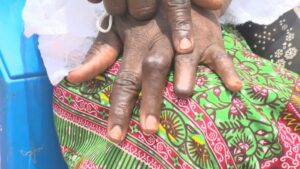
Meri is pained that a group of men decided what happened next after she was brutalised.
She is however grateful to the Member of Parliament for paying her medical bills.
But she wants the boys who unleashed horror on her to be arrested.
“I can count three boys from one family and four from another household. Government must arrest them and jail them so that they would learn a lesson not to attack people anyhow. I know all the boys who hurt me. Jafaru was the first to slap me. Jinda, Gina, Furu…”
Her wounds have healed the remnant of body scars and emotional scars remain, gnawing her heart. Meri says she will not know peace until the boys are brought to book.
Akua Denteh’s trial grinds slowly
There are currently 293 women banished into four witch camps in Northern Ghana. Many alleged witches are forced into camps and denied many basic human rights.
Some are tortured till they die. That is the story of Akua Denteh, a 90-year-old woman who was beaten till she died on July 23, 2020.
In a video that went viral, she was surrounded while two other women whipped and pounded her head repeatedly with a huge book believed to be the Quran. While she was being tortured, the mob chanted “Allahu Akbar”
In another video, two women are seen beating Akua Denteh up and pointing a machete close to her chest in a bid to force her to confess that she was a witch. She was forced to drink a concoction to prove that she was not one.
The frail-looking woman slumped in a chair while her attackers molested her and tortured her until she died subsequently.
Some suspects were arrested and arraigned before the court but justice is grinding rather slowly.
State Attorney, Francis Asobayire explained that witnesses commuting from Kafaba to Tamale has slowed down the court process.
He, however, promised that his team will do their best to bring justice to the family of Akua Denteh.
Asibi Duut woes
“He was aiming for my neck. He tried to cut it off with a machete. But I saw it fast enough and instinctively, blocked it with my hand. So, my hand got chopped off,” that is the story of Asibi Duut, a 40-year-old lady who is a resident of Sakogou in the North East Region of Ghana.
For the past eight years, she has been living without one hand. Her woes started when a young man accused her of being a witch.
Asibi said a lady in her community picked up a quarrel with her and subsequently got accused by the lady’s son of being a witch.
Initially, Asibi took the accusation lightly. But she realised the seriousness of the allegation when people in the community sent her to the witch camp in Gambaga to test whether she was a witch or not.
In northern Ghana, when you are accused of witchcraft, you have to bear the full cost of the ritual. So, Asibi took care of the full cost and the ritual confirmed that she was not guilty.
“I was cleared of witchcraft allegations, the fowl said I was not guilty. The chief then asked me to go back to Sakogu and ordered that we use dialogue to settle our differences,” she narrated.
Asibi, who was pregnant, said she thought she was free. But the young man had other plans.
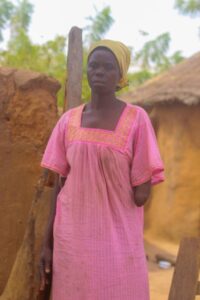
“I was cooking alone when I saw someone approaching me with a machete. He was aiming for my neck. He tried to cut it off with a machete. But I saw it fast enough and instinctively, blocked it with my hand. So, my hand got chopped off. He then fled. To date, the police say they cannot find him,” she wailed.
Asibi was left broken. But she had mastered ways of living independently and taking care of her son. Her husband also travelled to Southern Ghana and never got in touch with her.
She feels pains when the remaining hand is not covered. She cooks and does many other chores with one hand. She feels the young man who chopped off her hand had stolen her joy in life.
Asibi wants the Police to track down and arrest the perpetrator who is still on the run.
Kongit Langbon fled for her life
The next victim is Kongit Langbon. Her hand is badly is twisted and still hurts after 12 years.
Narrating her ordeal, Kongit said her husband’s second wife came into her hut and accused her of making her son ill.
Almost instantaneously, she was surrounded by many people in her village. They asked Kongit to heal him instantly.
“They surrounded me, started beating me. I had to flee. I fell and my hand twisted. I felt my bones snap! But they continued beating me. They asked me to leave the town. So, I run out of my house,” she narrated.
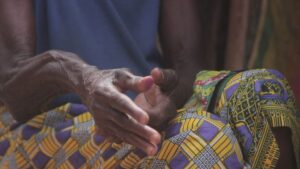
With a broken arm, weary heart and weak legs Kongit began a long walk to Gambaga for her safety.
She recounts that it took her five tortuous days journeying for her freedom to a place that would keep her safe, yet restrict her movement.
“I walked till I reached the Gambaga witch-camp. On my way to Gambaga, I had no food or water. I thought I would die but I was determined to escape and survive. I walked for many days, sleeping in the bushes wherever nightfall met me each day,” she added.
Kongit has been at the camp for 12 years and still harbours a lot of pain from that incident.
Her broken arm serves as a constant reminder of her pain. Sadness has enveloped her timid heart. She misses her children.
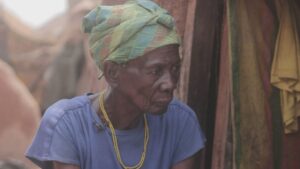
They never contacted her for 12 years until the 8th of March, 2021 when they called her on a mobile phone that belonged to people who managed the camp.
Kongit said she never went to the police station because her hometown had no police station. Although she had been living in Gambaga for 12 years, she had never been confident enough to visit the police station.
She believes all the people who beat her up are alive. She wants the police to interview her so that she would identify those who treated her like an animal.
Zeinab Tindana was abandoned by state institutions
Zeinab Kolgu Tindana, a resident of Zarantinga in the North East region woke up to an accusation that she was a witch. The allegation happened eight years ago.
Zeinab said when she inquired about the basis of this serious claim, she was told that she had appeared in someone’s dream.
Her accusers took her to the Gambaga shrine for witch trials and luckily for her, the fowl slaughter said she was not a witch.
So, she was then asked to return home. But her accusers were not satisfied with the answer from the shrine so, they mobilised and beat her up.
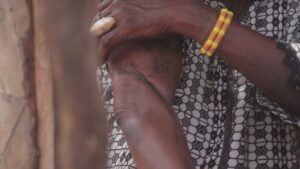
“The community members rejected me and started beating me again. One of them beat me with a bicycle chain and caused me serious injuries all over my right arm. He hit my right thumb with the chain and now I cannot use that thumb anymore. The man who hit me with the bicycle chain is known as Baba. He is the brother of my main accuser,” she narrated.
Zeinab said she run to the police station to report the case but they did not take her seriously.
She added that she went back to the police station for the third time persistently complaining until a military officer appealed to the police to arrest the perpetrators.
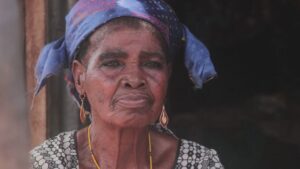
“The police themselves were attacked by the community and they fled in the confusion. The Police later went back with me to the Zarantinga community to effect the arrests but the people had run away.
“The police left and abandoned the case but I stayed back in Zarantinga. When the people saw that the Police had gone, they came to attack me again and I fled to Gambaga for the third time,” she said.
The police could not help her. In the long run, the outmoded harmful cultural practice won.
So, for 8 years, she lives in the witch camp against her will. Powerful state institutions could not help her.
“They said I sleep talk so I am a witch.”
The youngest ‘witch’ at the Gambaga camp
Mary, not her real name, is only 12 years. She is one of 12 children living in the Gambaga witch camp. Unlike other children who are in the witch camp to serve their grandmothers who have been banished,
Mary was accused of witchcraft.
Her accusers said she talked in her sleep.
The accusation started when Mary’s mother died. Her aunt Maame Asana who became her guardian heard her talking in her sleep and started accusing her of being a witch. So, they rushed her to the Gambaga witch camp for a witch trial.
At every witch trial, a fowl is slaughtered and the head of the shrine invokes incantations over the fowl. The chicken would struggle and “dance” on the ground for some time and bleed out to death.
The position that the fowl assumes would determine whether the accused person is a witch or not. So, a chicken would determine the entire fate and course of human beings accused of witchcraft.
If the chicken lies on its back, then the accused is not guilty but when if the chicken lies on its beak, then the accused is guilty.
Maame Asana was not satisfied that the shrine indicated that Mary was not a witch so they took her to a mallam who promised to exorcise the bad spirit in her.
Mary said that anytime anything bad happened in the house, she is blamed for it. For example, Maame Asana’s daughter fell ill and Mary was accused of making her sick spiritually.
So, they took Mary to the mallam and subsequently to a pastor to exorcise the bad spirit in her. Mary said she still talked in her sleep and that irritated her aunty who now brutalised her.
“The family members said that I should be taken back to Gambaga. When I refused, Seidu’s wife beat me with firewood that was still burning. I was seriously injured and the scars remain on my legs till today. I was also injured in my neck and chin,” she narrated.
Mary said although she is not a witch, she was made to believe that sleep talking was evil so she finally told them that she was a witch.
Finally, she was brought to the Gambaga witch camp.
Mary said she is now happy at the camp because the beatings had stopped. In the camp, she has been enrolled in a school so that she does not miss out on education.
Sampson Laar, the Coordinator and Manager of the Gambaga witch camp is disappointed the social welfare department did not intervene in this case. He said on many occasions the police have failed to act when old women had been attacked for being witches.
Food for the inmates is solely based on the benevolence of the Presbyterian Church, other well-meaning organisations and individuals. Sampson wants the government to provide some form of social protection to inmates there.
Meri, Asibi, Zeinab, Kongit, Mary and hundreds of women feel let down by a democratic system that was supposed to protect them.
The anti-Witchcraft bill
The former Speaker of Parliament Prof.Mike Oquaye indicated that a bill criminalizing witchcraft accusations and an attack would be brought before parliament.
Unfortunately, the draft bill has not been made public.
JoyNews check shows the bill has not progressed.
Source: myjoyonline.com